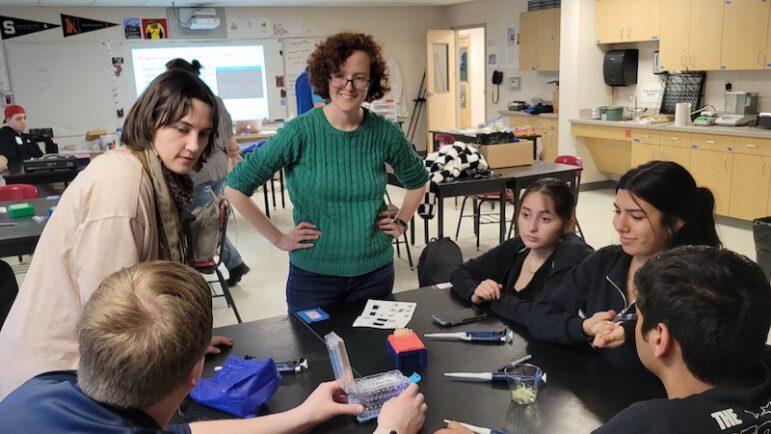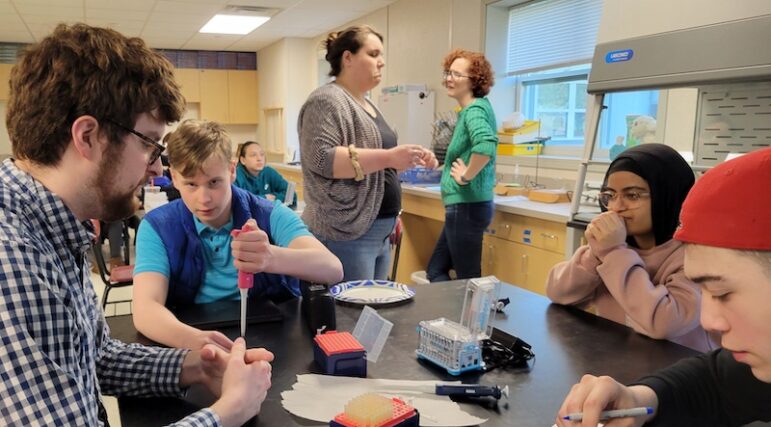
Photo by Charlie Breitrose Students at Watertown High School got to run hands-on lab analyses during the CoLAB Club. One of volunteers from life science companies, Bridget Kreger of C4 Therapeutics, second from left, and WHS chemistry teacher Liz Mundy look on as the students fill vials with samples.
While most of the school was dark and quiet, students were busy in one science classroom at Watertown High School well after the final bell working on a science experiment.
The students worked with volunteers from local life science companies as part of the CoLAB Club. The group meets once a month, and conducts simulations of real-world lab work using equipment similar to what the professionals use.
In April, more than a dozen students sat down to find out if an antibiotic-resistant bacteria from one farm that caused food poisoning had spread to two nearby farms. WHS chemistry teacher Liz Mundy introduced the scenario, and outlined the steps.
The students used a micropipette, a device which can measure out small quantities accurately with the press of the plunger, to measure out the samples. Then they set up gels in a mold that leaves a channel to test each of the four samples: a negative for the antibiotic-resistant bacteria control sample, a positive control sample, a sample from the first nearby farm, and a sample from the second nearby farm.
They also had to prepare the samples to be tested by putting a small amount of the bacteria into a Polymerase chain reaction (PCR) machine, which makes billions of copies of the bacteria by heating it up.
To do so, they used a machine called a miniPCR which can handle up to 12 samples at once. The machines are the same as the ones used in real labs, just smaller, said Bridget Kreger, principal scientist with C4 Therapeutics and a member of the CoLAB board. The ones used at C4 can handle up to 96 samples. The miniPCRs have been used by professional scientists in the International Space Station, and in remote wilderness areas, said Sam Ghilardi, a scientist at Sai Life Sciences.
Photo by Charlie Breitrose
Students get the opportunity to use the same equipment used by life science companies to run experiments during CoLAB Club at Watertown High School.
The scientists had some advice for the students as they prepared their samples.
“You can put them in any order but, pro tip, take a photo in case the label rubs off,” Ghilardi said.
Kreger added, “If you put the label on the side it is less likely to rub off.”
At the April meeting, about 15 students showed up, Mundy said, but typically there are more than 20.
“There are a lot of repeats, and each time we have some new people,” Mundy said. “I put it in the Monday announcements, they learn about it and sign up. I talk about it in my classes, and there is a bit of word of mouth.”
One of the students who heard about CoLAB was junior Gabe Colon. He has a strong interest in STEM (science, technology, engineering and math), but has a limited schedule because he works after school. He made time for the CoLAB Club.
He said he was inspired to learn more about life sciences after hearing about the discovery of drugs and therapies that fight a virus or disease.
“I want to find out what’s behind it,” Colon said.
Mundy said that the goal is to have some of the students build on the interests in science sparked by the CoLAB club, and some of the students might even find mentors.
“I hope they get a little more interested in science, some students form tight relationships with volunteers and contact them outside of the club,” Mundy said. “One has gone on job shadowing (with the mentor).”
Colon has gotten to know one of the professional volunteers, who has helped him out.
“We go over college expectations, meet and do some other things I am interested in: building skills, doing interviews,” Colon said. “It is not always biology related.”
Photo by Charlie Breitrose
The students in the CoLAB Club not only work with the scientists on the experiments, but also get to network with them and some of the volunteers have even become mentors to the students.
The 2023-24 school year was the third year of CoLAB High School STEM Career Collaboration has worked with Watertown High school, said Founder and President Merle Kummer.
The first year professionals came into the school to share their experiences with the students. Students have also made field trips to see inside local life science companies.
“We got volunteers through the career exploration presentations. They got really into it,” Kummer said. “This fall we added that third piece: The CoLAB Club.
Kummer now has a list of about 20 volunteers, and several sign up to help with the CoLAB Club each month.
The equipment and supplies for the labs were paid for by Acrivon Therapeutics, a Watertown-based life science company.
CoLAB runs from 3:30 to 6 p.m. Kummer also arranges for pizza to be delivered. The students took a break for dinner as their experiments ran. After they analyzed the results and wrote their reports on the experiment the students get time to network with the volunteers.
Find out more about CoLAB by clicking here.